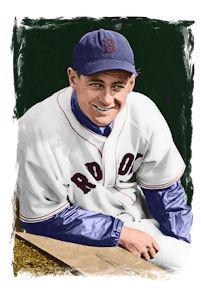 |
Bill Fleming was born on July 13, 1913, in Rowland Heights, California. The family moved to Pasadena when he was a child and young Bill went to eight years of grammar school in a two-room schoolhouse, then two years at Sutter City High. Thus ended his formal education. e had pitched in high school, where he also was the quarterback on the football team, then played semipro ball in the East Side Valley League and the Sacramento Valley League for two more years. If he’d not gone into baseball, he would have gone into civil service working for the U. S. Forestry Service. He was invited to come to San Francisco and pitch for them in the winter league and at the end of the winter, they signed him to a contract. His first year as a professional was in Oklahoma in 1936, optioned to the Muskogee Tigers of the Class-C Western Association. Bill started 1937 with the Mission Reds but he wasn’t used much, so in July he asked his manager if he’d send him out so he could get some work. Bill primarily pitched for the Vancouver Maple Leafs in 1937 and was a 20-game winner for the Bellingham (Washington) Chinooks in 1938, in the Class-B Western International League. His 20 wins also led the league and Bellingham finished in second place, but won that year’s league playoffs. That propelled him to AA Hollywood. He finished 12-16 and in September, his contract was reported as sold to the Detroit Tigers just before the draft deadline. He joined the Tigers for spring training in 1940, but was returned to Hollywood in April. He won 17 games for the Stars and was leading the Pacific Coast League in strikeouts, when he was purchased by the Boston Red Sox in August. The Sox were only six games behind the Cleveland Indians at the time, and hoped that adding the PCL ace would give them a boost. Bill talked with Sox GM Eddie Collins and got a salary of $1,000 a month plus the promise of an airplane ticket back to California at the end of the season. He lost two games and finally secured his first win in his last appearance of the season. The Sox remained high on him heading into the 1941 campaign. but he only had one start among his 16 appearances and his ERA was 3.92. In July, the Red Sox recalled Tex Hughson from the Louisville Colonels and optioned Bill to Louisville. In December his contract was sold outright to the Chicago Cubs. He stuck with the Cubs for the full 1942 season. In 1943 he pitched for the Cubs through June without a start, and 6.40 in ERA, then spent the rest of the season farmed out to the Milwaukee Brewers. He spent 1944 with the Cubs, started 18 of his 39 appearances, won nine and lost ten. The year Bill might have truly boosted the Cubs to a world championship was 1945. The Cubs finished first, falling to the Tigers in a seven-game World Series. Fleming followed the team’s progress from the United States Army. He entered the service in January at Marysville, California, and was assigned to Fort Lewis in Washington State. He was the 20th member of the Cubs to be taken into service during World War II and pitched for the Fort Lewis Warriors. Even though he’d won 11 games for Fort Lewis in 1945, he didn’t win any for the Cubs in 1946, his last year in the majors. He was optioned in July to the Los Angeles Angels. In 1948 the Angels released him right at the start of the season, but he signed on with the Portland Beavers and pitched for them for the rest of his playing career, working almost exclusively as a reliever. He voluntarily retired after the 1951 season, and became a coach for the Beavers in 1952 and 1953, appearing in two games in 1953. He continued as pitching coach through the 1956 season. Bill had a pilot’s license and flew his own private plane for a number of years. Starting in 1954, he worked as Superintendent of Maintenance and Parts Sales Manager for On Mark Engineering of Van Nuys, California, a company that specialized in converting military surplus airplanes. In the 1960s he moved to Reno, Nevada, to manage the U.S. Mining, Inc. ball team based there. After retiring, Bill Fleming lived in Reno and died there at an assisted-living community, of natural causes, at age 92, on June 4, 2006. |
|||||
